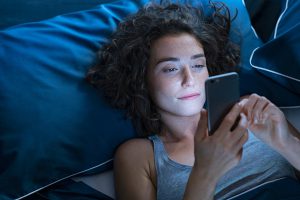 Devices such as smartphones, laptops, and smart televisions emit blue light, which is a color on the light spectrum that’s visible to the human eye. Blue light also contains the highest level of energy on the light spectrum.
Devices such as smartphones, laptops, and smart televisions emit blue light, which is a color on the light spectrum that’s visible to the human eye. Blue light also contains the highest level of energy on the light spectrum.
While blue light may offer benefits when utilized during the day, such as helping to boost attention and mood, it can cause several problems when used at night. The most common is interfering with our sleep cycles.
According to the Centers for Disease Control and Prevention (CDC), exposure to blue light emitted from devices used at night can make it difficult for us to fall asleep or can wake us up too early.
Blue light has this effect because light plays an essential role in aligning circadian rhythms, which is the body’s internal clock that helps to regulate sleep and wake cycles. The CDC explains that the “body’s circadian clock responds to light, as a signal to be awake, and dark, as a signal to fall asleep.”
Blue light stimulates the part of our brain that makes us alert and it suppresses the body’s secretion of melatonin; the hormone that makes us feel sleepy. Exposure can trick our brains into thinking it’s daytime even when using devices such as smartphones, tablets, or laptops at night.
To prevent this problem, and reduce the risk of blue light exposure, the Sleep Foundation recommends:
• Turning off electronics two to three hours before bedtime
• Dimming the lights on electronics or using night mode
• Using smartphone or computer applications designed to reduce the emission of blue light
• Using an eye mask to sleep if you are unable to turn off or dim certain light sources
Creating a healthy sleep environment can help us to achieve the rest our bodies need to reenergize and heal. This involves making sure that lights do not interfere with our sleep.
To learn more about creating a healthy sleep environment, or to speak with a specialist about sleep-related health problems you may be experiencing, please schedule an appointment with Jamaica Hospital’s Sleep Center by calling 718-206-7001.
All content of this newsletter is intended for general information purposes only and is not intended or implied to be a substitute for professional medical advice, diagnosis or treatment. Please consult a medical professional before adopting any of the suggestions on this page. You must never disregard professional medical advice or delay seeking medical treatment based upon any content of this newsletter. PROMPTLY CONSULT YOUR PHYSICIAN OR CALL 911 IF YOU BELIEVE YOU HAVE A MEDICAL EMERGENCY.
